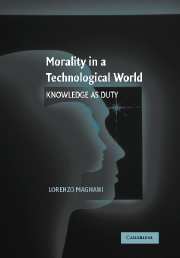Book contents
- Frontmatter
- Contents
- Preface
- 1 Respecting People as Things: Environment
- 2 Treating People as Means: Cloning
- 3 Hybrid People, Hybrid Selves: Artifacts, Consciousness, Free Will
- 4 Knowledge as Duty: Cyberprivacy
- 5 Freedom and Responsibility: Bad Faith
- 6 Creating Ethics: Good Reasons and Good Arguments
- 7 Inferring Reasons: Practical Reasoning, Abduction, Moral Mediators
- Afterword
- References
- Index
Preface
Published online by Cambridge University Press: 18 July 2009
- Frontmatter
- Contents
- Preface
- 1 Respecting People as Things: Environment
- 2 Treating People as Means: Cloning
- 3 Hybrid People, Hybrid Selves: Artifacts, Consciousness, Free Will
- 4 Knowledge as Duty: Cyberprivacy
- 5 Freedom and Responsibility: Bad Faith
- 6 Creating Ethics: Good Reasons and Good Arguments
- 7 Inferring Reasons: Practical Reasoning, Abduction, Moral Mediators
- Afterword
- References
- Index
Summary
RESPECTING PEOPLE AS THINGS
When my institution, the University of Pavia, was founded near Milan in 1361, women were viewed very differently from the way we see women today. Back then, a woman living in one of the centuries-old houses I pass each day on my way to work here in Pavia would not have been considered as “human” as a man: seven hundred years ago, she would have essentially been property – first her father's and then, later, her husband's – and she would probably have had little control over matters concerning her family or her own destiny. There is a very good chance that she would have been illiterate, as were most women and many men in medieval Europe, and she certainly would not have been permitted to attend the city's then-new university. In the fourteenth century, the centers of learning in northern Italy were among the most advanced in the world, yet even they considered women to be unworthy or incapable of being educated. Indeed, it took nearly 400 years for women to gain admission to the University of Pavia, and not until the eighteenth century was a degree awarded to a woman: Maria Pellegrini Amoretti (who was from a wealthy family, not surprisingly) took a law degree in 1777.
At the institution today, however, women work alongside men as both students and faculty members, and while we must continue to strive for gender equity, the current level of intellectual interaction between female and male scholars would have been unimaginable in the medieval world.
- Type
- Chapter
- Information
- Morality in a Technological WorldKnowledge as Duty, pp. ix - xviPublisher: Cambridge University PressPrint publication year: 2007

